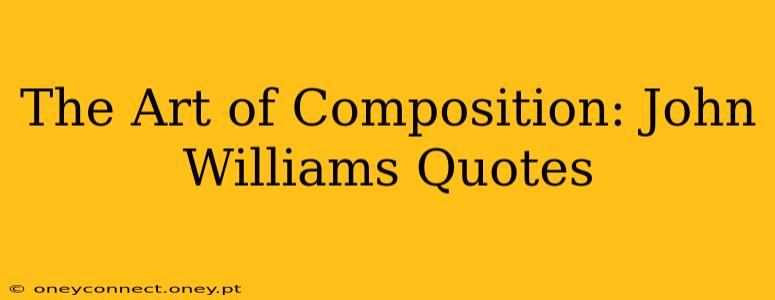John Williams, the legendary film composer, has crafted some of the most iconic and memorable scores in cinematic history. His work transcends mere accompaniment; it becomes an integral part of the storytelling, evoking powerful emotions and enriching the viewer's experience. While Williams himself rarely grants extensive interviews delving into his compositional process, his infrequent pronouncements offer glimpses into his artistic philosophy and the profound thoughtfulness behind his seemingly effortless genius. This exploration delves into some of his most insightful quotes, analyzing their meaning and revealing the principles behind his masterful compositions.
What are some of John Williams' most famous quotes about composing?
This is a question often asked by aspiring composers and film music enthusiasts alike. Pinpointing the most famous is difficult, as the accessibility of his interviews and quotes varies. However, many of his observations on the creative process, often expressed succinctly, have resonated deeply. We'll explore some key themes that emerge from his statements.
How does John Williams describe his creative process?
Williams often emphasizes the importance of emotional clarity in his compositions. While technical proficiency is undeniable, his focus remains on conveying the emotions inherent in the film's narrative. He doesn't just write notes; he translates feelings into musical language. This emotional directness is key to his enduring appeal. While specific quotes directly detailing his step-by-step process are rare, the results speak volumes. The immediacy and emotional resonance of his scores suggest a process driven by intuition and a deep understanding of narrative.
What is John Williams' philosophy on musical storytelling?
Williams believes music should serve the story, enhancing its impact rather than overshadowing it. He understands that film music is a collaborative art form, requiring a sensitive understanding of the director's vision and the overall narrative arc. This collaborative spirit, combined with his innate musicality, allows him to create scores that are both deeply moving and seamlessly integrated with the visual elements. His quotes, while not explicitly stating this philosophy in full, consistently point towards this collaborative, story-driven approach.
How does John Williams use melody and harmony in his compositions?
Williams' mastery of melody is legendary. His melodies are instantly recognizable, memorable, and emotionally resonant. He possesses a gift for crafting themes that encapsulate the essence of a character or a scene. His skillful use of harmony supports and enhances these melodies, creating a rich and satisfying listening experience. While he doesn't often delve into the technical aspects of his compositional techniques in public statements, the results speak for themselves. The elegance and simplicity of his melodies, coupled with the emotional depth of his harmonic language, are hallmarks of his style.
What inspires John Williams' compositions?
Inspiration for Williams is clearly rooted in the narrative and emotional core of the film. He immerses himself in the story, understanding the characters' motivations and the overall emotional trajectory. This deep engagement with the source material allows him to create music that is not merely illustrative but deeply expressive and profoundly moving. While specific muses or external inspirations may be hard to definitively pinpoint from his public statements, the profound emotional connection between his music and the films themselves is undeniable.
Conclusion: The Enduring Legacy of John Williams
John Williams' impact on film music is immeasurable. His quotes, though sparse, provide glimpses into the profound thought and artistic vision that underpin his extraordinary work. While he may not offer detailed technical breakdowns of his compositional methods, the enduring power and emotional depth of his scores serve as a testament to his genius. His legacy continues to inspire generations of composers, highlighting the enduring importance of emotional clarity, narrative understanding, and collaborative spirit in the art of film scoring. His unassuming demeanor and focus on the power of music to move audiences is a powerful lesson in itself.

